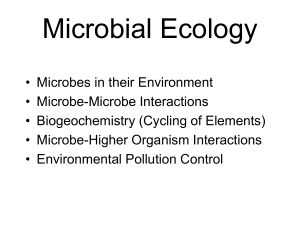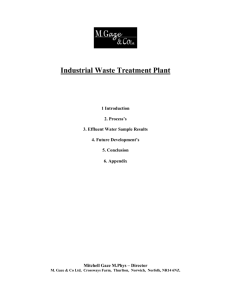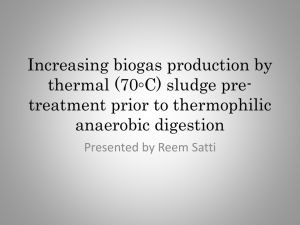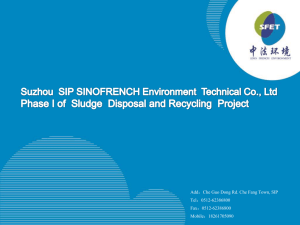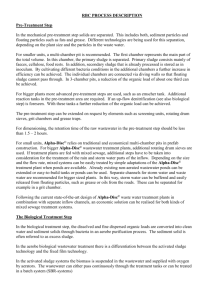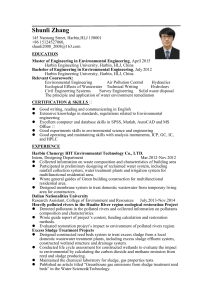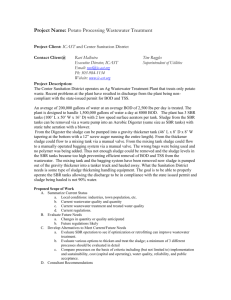document - Living Lab Biobased Brazil
advertisement
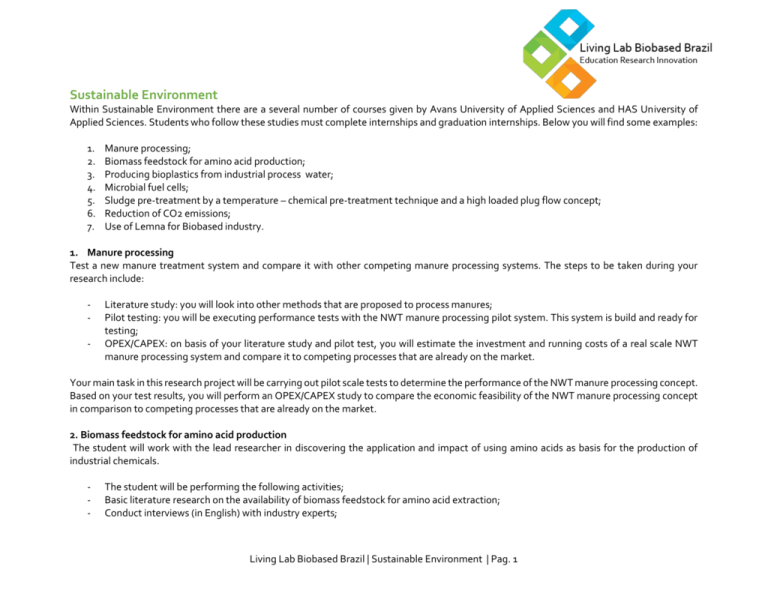
Sustainable Environment Within Sustainable Environment there are a several number of courses given by Avans University of Applied Sciences and HAS University of Applied Sciences. Students who follow these studies must complete internships and graduation internships. Below you will find some examples: 1. 2. 3. 4. 5. 6. 7. Manure processing; Biomass feedstock for amino acid production; Producing bioplastics from industrial process water; Microbial fuel cells; Sludge pre-treatment by a temperature – chemical pre-treatment technique and a high loaded plug flow concept; Reduction of CO2 emissions; Use of Lemna for Biobased industry. 1. Manure processing Test a new manure treatment system and compare it with other competing manure processing systems. The steps to be taken during your research include: - Literature study: you will look into other methods that are proposed to process manures; Pilot testing: you will be executing performance tests with the NWT manure processing pilot system. This system is build and ready for testing; OPEX/CAPEX: on basis of your literature study and pilot test, you will estimate the investment and running costs of a real scale NWT manure processing system and compare it to competing processes that are already on the market. Your main task in this research project will be carrying out pilot scale tests to determine the performance of the NWT manure processing concept. Based on your test results, you will perform an OPEX/CAPEX study to compare the economic feasibility of the NWT manure processing concept in comparison to competing processes that are already on the market. 2. Biomass feedstock for amino acid production The student will work with the lead researcher in discovering the application and impact of using amino acids as basis for the production of industrial chemicals. - The student will be performing the following activities; Basic literature research on the availability of biomass feedstock for amino acid extraction; Conduct interviews (in English) with industry experts; Living Lab Biobased Brazil | Sustainable Environment | Pag. 1 - Build and geo-code this data into a Geographic Information System; - Maintain a geo-database. The products at the end of the internship will be: A. A geo-database; B. A report from the interviews with industry professionals. 3. Producing bioplastics from waste water Conversion of organics from wastewater into biopolymers is the next level sustainable waste management. TU Delft has developed a technology to produce PHA, a valuable biopolymer, from wastewater by cultivating a microbial enrichment cultures capable of storing up to 90% of their weight as PHA product. To identify bottlenecks in large scale production and produce larger amounts of polymers for material testing a pilot set up is located at a company. We are looking for a motivated student who will take part in the pilot plant research. The main research objectives are: - To maximize the polymer content of the biomass and characterize the system; Based on these results design a concept for a full scale installation. We are offering a challenging project that will help you develop both engineering and scientific skills: - Bioreactor operation; Sample analysis; Data interpretation; Conceptual Process Design. 4. Microbial fuel cells The company has taken an interest into a new project that consists of the production of “Bio electrochemical cells” also known as Microbial Fuel cells (MFC). The theory behind this project is that by introducing a culture of bacterial to the anode of the fuel cell and feeding inorganic/organic matter into the chamber, the decomposing process yields an electron concentration. In the metabolic process, the bacteria yield electrons from the bio-transformation and oxidization of the precursor chemicals producing an electrical current (electricity) which would be captured by the cell. The relevance of this project to the environmental science study is that this technology can be used to treat waste effluence and soil (or metal retrieval) while at the same time producing electrical energy. Living Lab Biobased Brazil | Sustainable Environment | Pag. 2 The main goal of the project is to optimize this technology to produce a reasonable energy density and find out how to implement it with Magneto products. 5. Sludge pre-treatment by a temperature – chemical pre-treatment technique and a high loaded plug flow concept. Digestion of sludge formed after the treatment of domestic wastewater has gained a lot of attention in the last year and will remain to do so in the future. Reasons for this are the focus of Dutch Water boards on energy production to realize so called ‘Energy Factories’, and to reduce the amount of sludge for final sludge handling which is a major expense for the Water boards. xxxxx developed two pre-treatment techniques with the aim to increase the sludge degradation and maximize the biogas production. One of these techniques is a temperature – chemical pretreatment, the other is a high-loaded plug flow concept. Recently we received a grant to develop both techniques on pilot scale. The research for this will take 1.5 – 2 years starting from now. Research topics that will be investigated (and not being exhaustive) for temperature – chemical pre- treatment technique are: - Effect of different sludge mixtures (primary and secondary), variations in pre-treatment (temperature, duration, type and dosage of chemicals), sludge aging and sludge storage at wastewater treatment plant on degradation of sludge, tested in batch tests; Effect of load, sudden loads and overloads situations on performance of the sludge digester, tested on laboratory scale reactors; Comparison of the performance of the sludge digester at pilot scale with a sludge digester at laboratory scale by parallel testing. Research topics that will be investigated (and not being exhaustive) for the high-loaded plug flow concept are: A. Testing technical issues on laboratory scale like implementation of chemical pre-treatment system and compartments in plug flow system; B. Study the performance of the sludge digester at pilot scale at changing loads and selected pre-treatment and study the effect of the plug flow digestion on sludge dewatering; C. Investigation on issues like appropriate sludge feed (mixture of primary and secondary sludge), conditions for optimal mixing-feedingsettling and struvite formation. 6. Reduction of CO2 emissions This assignment is affiliated to the CO2 reduction and sustainable spatial development committee, belong to of the Climate Programme of the municipality Breda. This committee has conducted a survey of locations that due to the economic stagnation are available for temporary use. The municipality of Breda wishes to re-use the now vacant lots for the purpose of CO2 reduction or the production of sustainable energy. The goal of this assignment is therefore to investigate the feasibility of different forms of temporary land re-use for an already determined set of locations. The result of this investigation will be an assessment framework which can be used to develop business cases in a later stage. The execution of this study will be performed by two students fulfilling complementary tasks in two parallel tracks. The first track will be conducted from the angle of spatial planning, the second track will be conducted with the available technology as starting point. Living Lab Biobased Brazil | Sustainable Environment | Pag. 3 The goal of this assignment is: - Finding and identifying different forms of temporary land use (eg. Solar, biomass) for energy production / CO2-reduction; Establishing which parameters determine the feasibility of these temporary uses; Establishing the differences and similarities of the plots and the influence of the characteristics (timeframe, size, legal aspects, etc.) on the feasibility of temporary use; Setting up a matrix of global payback periods and conditions to quickly asses available lots dependent on their characteristics. To fulfil the goals mentioned above the student shall: Conduct a desk survey of available technologies. Conduct interviews with program partners, stakeholders, etc. Work together with colleague students carrying out parallel parts of the program. 7. Use of Lemna for Biobased industry Lemna (or duckweed) is a fast growing, floating water plant. It has a high protein content and may therefore be a valuable raw material for the biobased industry. Besides it cleans water by taking up nutrients (NPK) from it. In May 2014 the lectorate biobased energy of Avans and Waterboard Brabantse Delta started a pilot plant at the sewage treatment plant “Nieuwveer”. Here Lemna is produced on one of the streams of (cleaned) sewage water. This pilot needs optimization and maintenance. We are also interested in the influence of several parameters (light, temperature, CO2, nutrients) on the amount and composition of Lemna. The student will be performing the following activities: - Maintenance and monitoring of the pilot plant; Harvesting of Lemna; Aalysis of (water)samples taken at the pilot plant; Optimization of the conditions in the pilot plant; Literature study on growth conditions for Lemna; (Design of) controlled lab experiments on the effect of parameters like light, concentrations of nutrients et cetera. The products at the end of the internship will be: A. An optimized pilot plant; B. Data on the influence of parameters on the growth of Lemna; C. A report describing results and a design for further research on growth conditions. Living Lab Biobased Brazil | Sustainable Environment | Pag. 4 Contact information Jappe de Best dr. ir. Avans University of Applied Sciences ATGM Lovensdijkstraat 63, Breda 4800 RA Breda E-mail: jh.debest@avans.nl | www.avans.nl Dimitri Lamers HAS University of Applied Sciences Department of Environmental Science Onderwijsboulevard 221, 's-Hertogenbosch 5223 DE 's-Hertogenbosch E-mail: D.Lamers@has.nl | www.has.nl Living Lab Biobased Brazil | Sustainable Environment | Pag. 5
